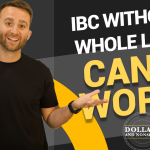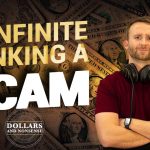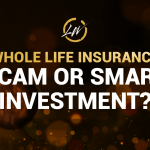In this episode, we discuss the concept of self-insurance often peddled by many self-proclaimed financial gurus. We’ll also discuss and share how the economic value of certainty can improve the quality of your life.
Topics Discussed:
- Dave Ramsey, Susie Orman, and others peddling self-insurance
- Concept overview
- Problem one with the concept: You wouldn’t do this under comparable conditions
- Problem two with the concept: Opportunity loss
- When business owners lose out
- Thinking long-term by thinking generational wealth
Episode Resources:
- Gain access to our Secret Banking Masterclass now FREE to listeners of the podcast here now
- What is Infinite Banking
- Post episode: Why Dave Ramsey is Wrong
- CREDIT: Episode art background photo by Bradley Dunn
Podcast transcript for episode 110: Truth about Self Insuranc
Nate: In this episode, we discuss the concept of self-insurance that is peddled by many financial gurus. And we’ll also discuss how the economic value of certainty can improve the quality of your life. She’s Holly, and she helps people find financial freedom.
Holly: He’s Nate. He makes sense out of money. This is Dollars and Nonsense. If you follow the herd, you will be slaughtered.
Nate: Hi. Well, welcome back everyone. Today, we have another exciting episode. We’re going to dive into a topic that you, if you’ve been around people like Dave Ramsey, Susie Orman, or some other financial guru style people, you may have heard this concept of self-insurance where, while you’re building wealth, you need things like life insurance and car insurance and disability insurance, and so forth. But once you get to a certain stage in your life, in your wealth, you no longer need to be paying these stupid insurance companies anymore premiums. You’ve got enough assets to take care of yourself. So we can cancel all the insurance products and go on our merry way.
That’s the vibe that we get from some of these, and Holly and I, we disagree with quite a bit of what they are suggesting when they talk about the concept of self-insurance. So Holly, let’s go ahead and dive in to the idea of self-insurance.
Holly: As much as you think you’re planning for the future, you’re not. So the analogy of you have $1 million in the bank and your house is worth $1 million. So you have no homeowners insurance, right? Because you’ve got the million dollars to cover the house. Well, if the house burns down in a fire, then you don’t have the house. It’s gone. And the million dollars in the bank is going to be used to build the house, yet it doesn’t cover any of the costs of the possessions inside the house. So the time, energy, your efforts.
So really you’re not planning for the future as much as you’re just like, well, I’ve got the million dollars here and I’ve got a million dollars here, so I’m good to go. Yet if you look long-term, I think you’re missing out on the big picture that you’re not even protecting your money or yourself, and you’ve stopped the ability to leave a legacy for anybody or anything in your family.
Nate: Yeah. Self-insurance may work well if life works perfectly for you, and you don’t actually ever need to use insurance ever in your life. But for the vast majority of us, as Holly mentioned, the concept of insurance is actually helpful. It’s that we’re all pooling our resources together to transfer risk, because it is, as you just mentioned, if you have a $1 million home and you have a million dollars in your bank account, you don’t technically need home insurance. You can replace the house, but that doesn’t actually in a vacuum mean that you should get rid of the home insurance, because we would all rather be protected.
There’s certainty in that, hey, I don’t have to keep my million dollars sitting in a bank account on the sidelines just in case my house burns down. I can actually go put that money to work elsewhere to earn higher returns, and do more things with it because I have the insurance.
So the other thing maybe we could talk about, Holly, is what having the insurance allows you to do, the opportunities it can open up. Because if you’re focused on proactively achieving things with money and with your time, insurance can be your best friend. As I just mentioned, you don’t have to keep a whole bunch of money on the sidelines just in case of money. It could be the case with disability insurance by the way. You don’t have to keep a whole bunch of money on the sidelines, just in case something was happening and you had to miss work. You can actually go out and put the money to work elsewhere, whether it’s buying real estate, or using it in your business or something like that. Because you have the interest, it actually frees you to do certain things that otherwise you would not be able to do.
Holly: When you say, just in case of, that just in case of a million dollars. Do we really want to just leave a million dollars sitting somewhere just in case of? I mean, that’s what insurance, like you said, it allows you to do the ability not to just have to park your money. And I think most of us didn’t predict in 2020 what would happen with COVID. And so that just in case of fund probably doesn’t look the same like it did when you first started. And if you’d had the ability to have insurance, you could have had the just in case fund still there, and still been able to use the money.
Nate: Exactly. Exactly. I know, just for me, you and I were talking about this before we got on the phone, I just recently hit a deer driving home. The deer took it a lot worse than my car, thankfully. That really smashed the thing, and the car turned out okay. But still even with what I would look at is as essentially minor damage, mainly just bumper trouble. It’s going to be over $5,000 to be repaired. Well, I do not need the $5,000 insurance. In other words, I have comprehensive and collision insurance on my car. It’s not because I need it. I have plenty of assets to be able to pay for this damage that’s done. And to be able to pay much more than that.
I certainly don’t need to insure my own vehicle. However, just the fact that I own the insurance brings this level of certainty to my life and freedom to where all I have to do is just drop the car off at the shop and let somebody else, let the insurance company take care of the costs. And that does something to me inside where I don’t always have to have this contingency fund for car repair or car damage. Cause I’m just choosing to self-insure. I don’t have to prepare for it myself.
I enjoy that level of certainty. I enjoy that. It’s allowing me to be free with my money, not have to keep things on the side. And I enjoy this life. I enjoy it better knowing certain things are covered. And I don’t think we can go any further, Holly, than with the world of whole life insurance, which I think is where a lot of these gurus kind of attack the world of insurance. Quite a bit of the time it’s in the world of life insurance. They say, hey, you only needed until you get to a certain point. And then if your family can be taken care of upon your death, because of the assets you’ve built up then you no longer need it. I think we could buck up against that concept in quite a few different angles if we want to.
Holly: Yeah. And really what they promote, Nate, is that if you have the cash to cover losses, why wouldn’t you cut a monthly premium cost for that whole life insurance? Why would you do that? Like, you’re just wasting money. Yet the reality is that when you have, and this is one of the points in this, when we have life insurance, it actually transfers the risk and it saves you money in the long run whether you believe it or not. It doesn’t just save you money like Nate said. I’m going to say it saves time. It saves energy. It saves effort. I know that with my life insurance, when I’ve needed money quickly, Nate, and I have it in my life insurance policy. It’s less than 10 minutes to make a phone call or fill out the form to take a loan out. Yet if I had to go to the bank and do all of that, what a pain. The fact that the life insurance can actually grow your money for you. So it’s growing tax-free, yet you have the freedom to still be able to transfer the risk and cover your costs. I mean, I think you’re killing more than a couple of birds with one stone.
Nate: Yeah, I think you’re right. I mean, one of the things that’s big to me on this whole value of just being certain of what’s coming is, if you have transferred a lot of the risk in your life to other people, that completely frees you to be able to focus on the things that actually produce a lot of value in your own life. So if you already know that a premature death, or disability, or car wreck, or home burning down is just completely taken care of due to this concept of insurance, then that allows you to just be a far more productive person.
So that’s why you find a lot of businesses and business owners typically have many different forms of insurance because they’re trying to protect against the unexpected. That doesn’t mean they’re not wealthy. It doesn’t mean that the unexpected, they couldn’t actually pay for it out of pocket if something was to happen. But as soon as you buy the policy that covers something that’s unexpected that might come your way, it immediately frees you, knowing that it’s completely taken care of. And your resources can then be invested elsewhere to produce a higher return or value to you in whatever way that you would want to do it for.
And that’s the same thing with whole life insurance, essentially, as we’ve talked about. The self- insurance people would say the premium, you got to get rid of that thing. Instead, you’ve got enough money. Cancel that. Take that premium and put it to better use elsewhere. And what’s funny is I think Dave Ramsey, Holly, is probably one of the biggest proponents of self-insurance, especially with life insurance. I remember him talking about at one time. And I don’t mean just to fight Dave Ramsey. As I’ve said plenty of times, there’s a lot of things that he says I agree with.
There’s plenty of things I don’t agree with. I don’t think he’s just a bad guy. I’m not trying to attack him. I just thought it was funny when he was talking about this whole idea of self-insurance, that once you get to a certain point, then you’ll be wealthy enough to where you won’t need life insurance. You can just cancel it. But in the process of talking about that, he then mentions that he actually still owns a $2 million term life insurance policy. And the guy was like, well, why did he do that? Obviously, if anyone is following your rules who wouldn’t need this, it would be you, Dave. And Dave said he owns it just because his wife wants it. His wife wants him to have it.
And I’m like, bingo, that’s it. There’s never a time where someone is on their death bed and they’re wishing they didn’t have the insurance. I don’t care if you’re 40, or if you’re 80, or anywhere in between, there’s never a time where your family members kind of wish you would have canceled that thing. I mean, there’s never a time you wish you didn’t have it. And that’s exactly what’s going on here. They certainly don’t need it.
But if he was to pass away prematurely, his wife, though she would probably be okay, maybe she wouldn’t want to start spending down their assets just to survive because the income is no longer coming in from Dave. Maybe she would like to spend down the death benefit of this policy. That way that she can preserve their assets, and not have to use that money to survive. And that’s the definition of insurance. And it seems good enough for him. Yet he’s out there telling the world, you probably don’t need it after a certain point. Sure, you might not need it, but the question is, does it produce value to you to own it? In which case I would say, absolutely.
Announcer: Are you still stuck in insecurity and uncertainty? Do you want to feel like a financial genius and confident about your future? Holly and Nate have prepared something exclusively for Dollars and Nonsense listeners. It’s called The Secret Banking Masterclass. You can gain free access to this course by visiting livingwealth.com/secretbanking. That’s secretbanking, all one word.
The course will share with you how the conventional system stacks the deck against you, and exactly how to break free from their system. We believe in challenging the status quo. We believe in defying conventional wealth tools while maintaining traditional values. After all, most of those conventional tools only ever seem to make someone else on the inner circle rich. Visit livingwealth.com/secretbanking. That’s secretbanking, all one word. Ease your worry, and start your journey towards security today. Visit livingwealth.com/secretbanking. Now back to the great episode with Nate and Holly.
Holly: Here’s another thing to think about. If you’ve saved the million or $2 million reserve, Nate, like you said, it’s not protected. It’s not protected at all. Somebody could sue your family, could go after, you had debts that piled up that they still want to be paid off and they can go after that asset that you saved. With a life insurance policy, at least the death benefit goes to the beneficiary.
Nate: Exactly. And there’s no way it can go to any creditors or anything of that sort.
Holly: Yeah. It’s protected to an extent. And I say protected because, in all reality, how quickly does that money go? You might have a million dollars today and think that’s enough for in the future. But I’ll say I talked to a couple this morning, Nate, and the mom said, hey, why don’t you buy a life insurance policy on me? And she’s 85 years old. So even at that age, she is still thinking long-term of what is best for my family. And she has some policies, which I was just amazed. She had some policies and said, well see if I’m insurable, right? See if I’m insurable. You guys should have a policy on me.
She’s not thinking, hey, I’m near the end of my life, and I got the money in the bank and I’ve got these other policies. She’s thinking, hey, this is beneficial even to my son and my daughter-in-law. And I think that that mentality of not insuring yourself, but knowing that you’re insured through life insurance that spreads the risk. And I’m going to say the wealthy, Nate, the very, very wealthy, they own whole life insurance. They’re not dumb. They’re not stupid. They’ve taken their money and they’ve put it somewhere where it’s protected. They didn’t just leave it in a bank letting the bank use all their money. That’s not how they got wealthy to begin with.
Nate: That’s right. There’s something in my own personal life where I own a ton of life insurance, especially. I own a ton of it. And there’s just something about the day that you sign this policy that you know no matter what happens there is going to be a huge check, whether it’s tomorrow or 50 years from now, paid to my beneficiaries. Whether that’s my wife, whether that’s my children, whether that’s my grandchildren. From day one, there’s a certainty there that doesn’t exist anywhere else. Not even in the world of term insurance, because that is obviously only there for a period of time.
But as soon as you buy an IBC policy, a whole life policy, there’s certainty that it doesn’t matter if it’s tomorrow or 50 years, there’s going to be a large check sent to my beneficiaries. And then on top of that, well, you and I mainly focus on via the cash value. There’s also a certainty that every single year my cash value is going to increase, guaranteed without fail. As soon as I sign up I know exactly what my guaranteed cash value is going to be 20 years, 30 years, 40 years, 50 years down the road.
And there’s nothing else like it, but that’s what insurance can do. It produces certainty, whether that’s home insurance, whether that’s disability insurance, whether that’s car insurance, or whether that’s in the realm of life insurance. There is true value that can come from looking into the future and knowing exactly, come hell or high water, that this thing is going to pay out when I need it. That’s what insurance is all about at its core.
Now, you and I don’t talk a lot about it in that way, because we’re so focused on the banking concept. I’ve spoken to some clients and they brought up this idea of, well, I don’t need the insurance or something like that. And it was like, okay, but do you want it? I mean it’s like, yeah, you might be able to pass away and your family would be able to survive without it. Same as Dave Ramsey’s family. But is it possible that there’s a real reason to own it, that it produces value, not only in the cash value, but in the certainty of the death benefit? And we could keep going on and on about it. I don’t need to go on a ton of rabbit trails, but there’s certainly value to it. It doesn’t actually matter how wealthy or poor you are. There’s a big need for it across the board.
Holly: And Nate, I think that you should really honestly ask yourself, the more assets and resources, cash and things you acquire and you have, the more you should want insurance. You should not want to get rid of it, no matter what type of insurance it is. But the more wealthy you become, or the more assets you obtain, I would think you would want more life insurance, or home insurance, whatever that may be. But I’m going to focus on the life insurance, like you said, Nate, because I know that without a shadow of a doubt, when I buy that policy, easily the money I spend replaces a significant amount of my assets.
Nate: Exactly right. I mean, that’s one of the reasons why I definitely feel like everyone should have at least as much death benefit as they do in assets outside of the world of life insurance. Because if you were to pass away, do you actually want your family to have to spend down your assets? I would probably say no. I’d rather them be able to live off of the death benefit, to transfer the risk away from having to spend down the family’s assets, to be able to spend the death benefit and keep the assets in the family. That’s what we’d like to be able to do if we need to do that. And everybody, that would be the case. Whether you’re 30 years old or 70, you would probably want that. Any last thoughts before we close it down for today?
Holly: Don’t think short-term, because I think that self-insurance is a short term perspective. I think you guys have to have long-term perspective. If you’ve talked to Nate or I, you know we say life is like a marathon. It’s not a hundred yard dash. And the hundred yard dash is the self-insurance to me. And the life insurance is that marathon.
Only two things will happen. You’re going to live or die. Well, if you’re going to live, then I think you have to have life insurance. And I think the self-insurance negates any of that mindset of thinking futuristic and legacy-wise. I think it just stops the growth of your money, and it stops your ability to really be able to provide for yourself, now and in the future.
Nate: Yeah, that’s definitely a great point. And with that being said, this is Dollars and Nonsense. If you follow the herd, you will get slaughtered.
Holly: For free transcripts and resources, please visit livingwealth.com/e110.
Announcer: Dollars and Nonsense podcast listeners, one more thing before you go. Ease your worry and start your journey towards security today. Visit livingwealth.com/secretbanking. You’ll gain free access to the special one-hour course Holly and Nate made for you. Again, that’s livingwealth.com/secretbanking.









